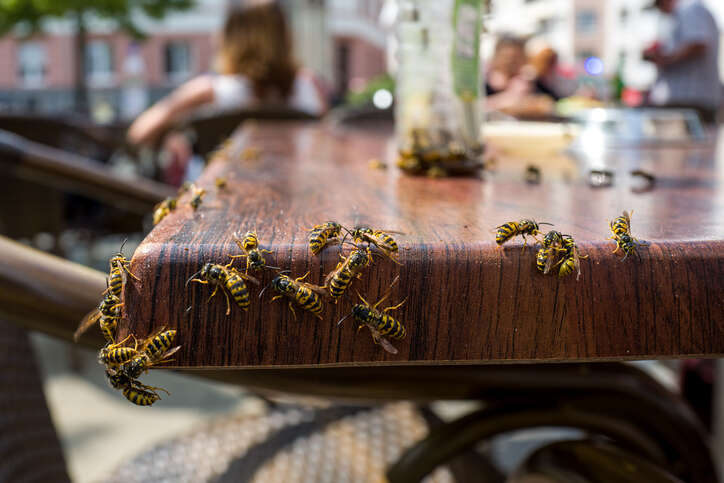
A warm winter and spring has given rise to the number of wasps in France, with reports showing a 140% increase in pest control requests to deal with nests. The increase has been so noticeable that France has declared 2022 ‘l’année de la guêpe’ or ‘the year of the wasp’.

Now, as the UK is set to experience another heatwave in the coming days, experts are warning that it may be in for a swarm of its own.
“France is Britain’s nearest continental neighbour and both countries have enjoyed record temperatures at New Year and the fifth mildest spring on record. That means more queen wasps survived the winter and conditions will have been perfect for establishing their nests this spring,” said Dr Quinton Fivelman, chief scientific officer, in a release from London Medical Laboratory.
“By August, most of the larvae have pupated, and the worker wasps have to get their sugar fix elsewhere. That’s when they become a problem as they swarm to our jam sandwiches and beers.”
[Read more: You think your house is clean – but you basically live in a zoo]
With the UK set to see temperatures soar this week, the number of wasp-friendly picnics, BBQs and pub garden tables is also set to increase.
How many wasps does the UK have?
There are 9,000 species of wasp in the UK and each year there are approximately ten fatalities that occur from stings. However, there may be more as some are often misdiagnosed. Though it may not result in a fatality for many, and a nasty sting is often enough for anyone, there is also the risk of those with an allergy suffering anaphylactic shock.
Fivelman continues to explain that those who have a severe allergic reaction to a wasp sting the first time they are stung have a 25% to 65% chance of anaphylaxis the next time they are unfortunate enough to feel the sting.
Symptoms to watch out for include feeling weak, dizzy, swelling and a rapid pulse. Allergy finger-prick tests are available for those concerned they may be allergic.
What not to do
The London Medical Laboritory highlights the key actions to take, or not take as the case may be, when confronted with a wasp.
- Don’t swat. Swiping at wasps makes them more likely to attack. Stay as still as possible; they usually fly away.
- Cover your drinks, especially sugary cokes and beers.
- Avoid bright clothing and perfumes. Wasps respond to bright colours and use scents to communicate. They may react aggressively to perfume.
Are there more wasps in my city?
Though it might seem like you are more at risk from wasps in the countryside, they are also fond of making nests in your local park or even your garden. Few green spaces are safe.
The Big Wasp Survey, which was set up as a recording scheme to map the diversity and distributions of social wasps in the UK, published results in 2019 after a large citizen engagement practice. Traps were set all around the country with many in urban areas, such as Greater London, showing significant urban wasp populations. The data is also supported by the Bees, Wasps & Ants Recording Society which highlights species such as the Median wasp, which typically nests in private gardens, often in large cities.
So, as the heat bakes, city-dwelling Brits will need to remain safe on two fronts unless they want to be sunburned and wasp-stung at the same time.
[Read more: Overfishing: Why coastal fishing cities need to act now]






